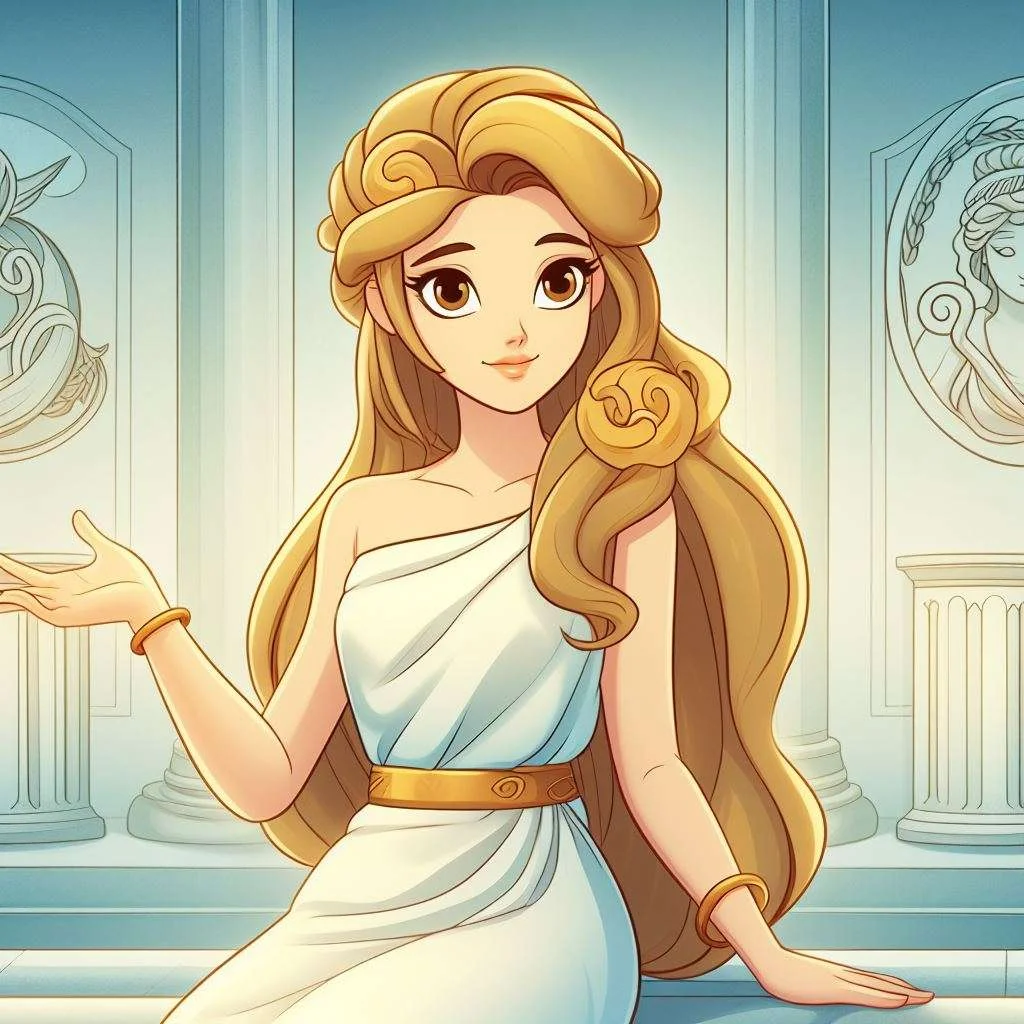In the ancient, sun-kissed lands of Greece, before her name evoked fear and her gaze turned the living to stone, Medusa was known for a beauty unparalleled, her hair a cascade of curls that shimmered like the sea under Helios’s chariot. This is her story, a tale woven from the threads of truth and tragedy, of a maiden doomed by the gods’ whims and a heart too pure for the world she inhabited.
In the heart of a lush, verdant island, where the olive trees danced to the melody of the Aegean winds, Medusa lived in a temple dedicated to Athena, the goddess of wisdom and war.
She was not merely a priestess; she was the embodiment of the goddess’s virtues: wise beyond her years, brave at heart, and beautiful, with a spirit as radiant as the dawn.
One day, as the first light of Eos tinted the sky with hues of gold and rose, Medusa knelt before the statue of Athena, her voice a soft whisper in the silent sanctuary.
“Great Athena, guide me to serve you with purity and strength,” she prayed, her heart alight with devotion.
The air shimmered, and Athena herself appeared before Medusa, her presence commanding yet comforting. “Medusa, your faith and beauty shine bright as the stars. I bestow upon you a gift,” Athena declared, her voice echoing through the temple.
A gentle touch of the goddess’s hand, and Medusa’s hair shimmered with an ethereal glow, each curl now reflecting the goddess’s wisdom and strength.
“Thank you, divine Athena. I am forever your servant,” Medusa replied, her eyes filled with tears of gratitude.
But fate, as ever, was a fickle weaver. Poseidon, the god of the sea, whose domain bordered Medusa’s home, became infatuated with her beauty. His gaze, as deep and tempestuous as the oceans, followed her every movement, his desire growing with each passing day.
One evening, as Medusa walked along the shoreline, her thoughts lost in the whisper of the waves, Poseidon appeared before her, his form cloaked in the mist of the sea.
“Medusa, jewel of the earth, join me in the depths of my kingdom. Your beauty deserves a throne beside mine,” he proposed his voice a mix of command and longing.
“Great Poseidon, I am honored, but my vow to Athena binds me. I must decline,” Medusa replied, her voice steady yet filled with regret, for she knew the peril in denying a god.
Poseidon’s eyes darkened like a storm at sea. “No mortal denies me,” he hissed, his pride wounded, a dangerous undertone in his voice.
Word of the encounter reached Athena, but the goddess’s reaction was not as one might expect. Her temple, a sanctuary of purity, had been tainted by Poseidon’s desires, and though Medusa was the victim, it was she who bore the brunt of Athena’s wrath.
“Athena, my protector, I stand before you, wronged but faithful,” Medusa pleaded, her heart heavy with sorrow, seeking solace in the goddess she revered.
Athena’s gaze was as cold as the marble of her statues. “Your beauty has brought this upon us, Medusa. It is a threat to the sanctity of my temple,” the goddess declared, her words a decree from which there was no appeal.
With a wave of Athena’s hand, Medusa’s lustrous hair turned to serpents, her once-admired gaze now a curse of stone. “Let this be your fate, Medusa: to protect what you have endangered with your beauty,” Athena proclaimed, her judgment irrevocable.
Banished to a desolate island, Medusa became a creature of solitude, her heart as fractured as the lives she unwillingly took. Her once joyous laughter was now a lament, her companions the shadows and the stone figures of those who dared to seek her out, driven by fear or the folly of heroism.
Yet, in her isolation, Medusa found a semblance of peace, her cursed gaze a guardian against the unwelcome, her serpentine hair a reminder of her strength and the price of divine envy.
Medusa’s tale, is one of beauty, betrayal, and a curse borne from the gods’ whims, echoes through the ages. It is a reminder of the capricious nature of those who dwell on Mount Olympus and the strength of those who endure their fates.
In the whispers of the wind through the olive groves and the murmur of the waves against the shore, Medusa’s story is told and retold, a legend not of a monster, but of a maiden wronged by the gods and remembered for her courage to face a destiny not of her choosing.
Also Read: Jacob and Esau — King Midas and The Golden Touch — Kratos and Zeus
Follow Up Questions
- How do you think Medusa felt when she was transformed, and why do you think Athena chose to punish her?
This question encourages kids to empathize with Medusa and think about the fairness of the consequences she faced, fostering discussions on justice and empathy.
- What would you have done if you were Medusa after the curse?
This question prompts children to imagine themselves in Medusa’s place, encouraging creative thinking and discussion about coping with difficult situations.
- Why do you think stories like Medusa’s are still told today, and what can we learn from them?
This question helps kids understand the relevance of ancient myths in modern times and encourages them to think about the lessons these stories can teach us about life and human nature.

